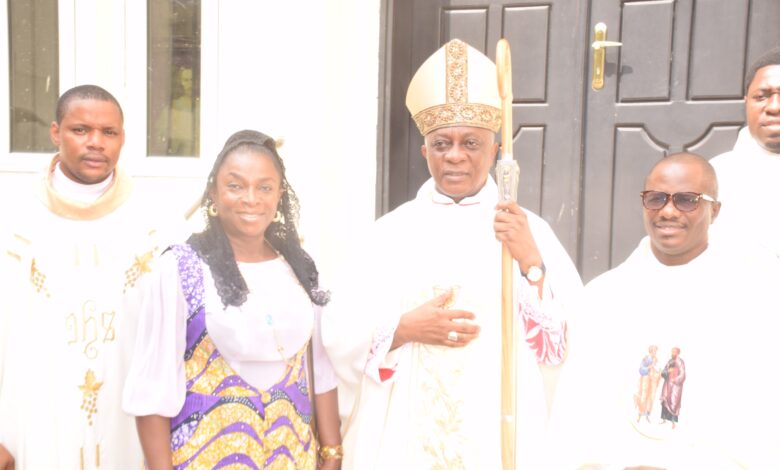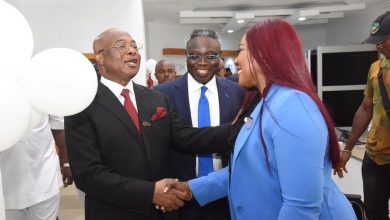World Communications Day: Pope Francis tasks media on investigative journalism

Photo: From left…Associate Cathedral Administrator, Holy Cross Cathedral, Reverend Father Raymond Emedo; President, Catholic Media Practitioners Association of Nigeria(CAMPAN) Lady Neta Nwosu; Catholic Archbishop of Lagos, His Grace, The Most Reverend Dr. Alfred Adewale Martins and Director, Directorate of Social Communications, Lagos Catholic Archdiocese, Reverend Father Tony Godonu during the Comemoration of the 2021 World Communications Day event held at Holy Cross Cathedral, Lagos Island on Sunday.
By George Aluo
Catholic Pontiff, Pope Francis has tasked media men to make investigative journalism the hallmark of the profession, even as he admonished users and consumers of internet to be more responsible.
The Holy father’s plea was the trust of the message he titled, ‘Come and See’ which was read during the 2021 World Communications Day Mass held at the Holy Cross Cathedral, Lagos on Sunday.
He said the invitation to “come and see”, which was part of those first moving encounters of Jesus with the disciples, is also the method for all authentic human communication.
Pope Francis stated that in order to tell the truth of life that becomes history, it is necessary for newsmen to move beyond the complacent attitude that we “already know” certain things, but to go and see them, spend time with people, listen to their stories and confront reality, which always in some way surprises everyone.
“Open your eyes with wonder to what you see, let your hands touch the freshness and vitality of things, so that when others read what you write, they too can touch first-hand the vibrant miracle of life. This was the advice that Blessed Manuel Lozano Garrido offered to his fellow journalists.”
He said, this year, he would like to devote the message to the invitation to “come and see”, which can serve as an inspiration for all communication that strives to be clear and honest, in the press, on the internet, in the Church’s daily preaching and in political or social communication.
“This has always been the way that the Christian faith has been communicated, from the time of those first encounters on the banks of the River Jordan and on the Sea of Galilee. Let us look first at the great issue of news reporting. Insightful voices have long expressed concern about the risk that original investigative reporting in newspapers and television, radio and web newscasts is being replaced by a reportage that adheres to a standard, often tendentious narrative. This approach is less capable of grasping the truth of things and the concrete lives of people, much less the more serious social phenomena or positive movements at the grass roots level.”
Pope Francis noted that the crisis of the publishing industry risks leading to a reportage created in newsrooms, in front of personal or company computers and on social networks, without ever “hitting the streets”, meeting people face to face to research stories or to verify certain situations first hand.
He stressed that unless the media practitioners open themselves to the kind of encounter, they will remain mere spectators, for all the technical innovations that enable themselves feel immersed in a larger and more immediate reality.
“Any instrument proves useful and valuable only to the extent that it motivates us to go out and see things that otherwise we would not know about, to post on the internet news that would not be available elsewhere, to allow for encounters that otherwise would never happen. That is how Christian faith begins, and how it is communicated: as direct knowledge, born of experience, and not of hearsay.”
The Pope commended the courage of many journalists, pointing out that journalism, as an account of reality, calls for an ability to go where no one else thinks of going: a readiness to set out and a desire to see. ‘I commend the curiosity, openness, passion of journalists. In fact, we owe a word of gratitude for the courage and commitment of all those professionals – journalists, camera operators, editors, directors – who often risk their lives in carrying out their work. Thanks to their efforts, we now know, for example, about the hardships endured by persecuted minorities in various parts of the world, numerous cases of oppression and injustice inflicted on the poor and on the environment, and many wars that otherwise would be overlooked.”





